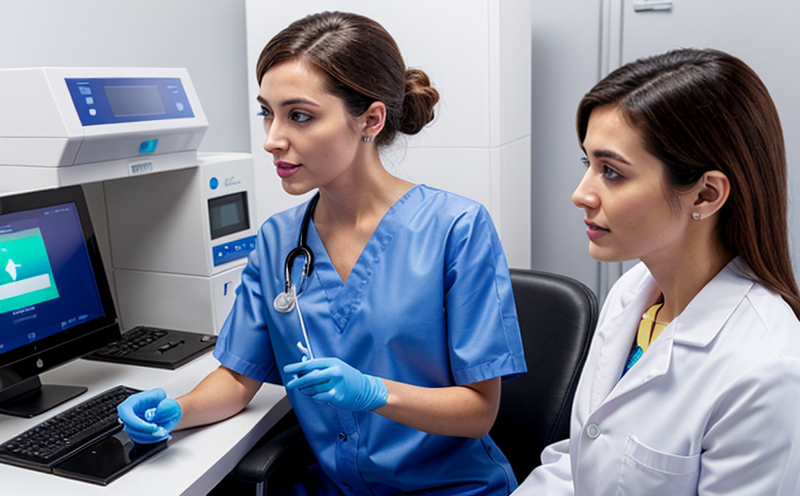Molecular Testing for Adenovirus in Wastewater
Adenoviruses are a group of viruses that can cause respiratory and gastrointestinal infections. In wastewater systems, the presence of adenoviruses can be indicative of human fecal contamination, which is a critical public health concern. Molecular testing for adenovirus in wastewater provides an efficient and accurate method to monitor this contamination.
Molecular testing involves the amplification and detection of viral nucleic acid using techniques such as polymerase chain reaction (PCR). This method allows for the specific identification and quantification of adenoviruses present in complex environmental samples. The process begins with sample collection, where wastewater is filtered to concentrate potential virus particles before being subjected to extraction procedures.
The extracted nucleic acid is then subjected to real-time PCR amplification. Real-time PCR not only detects the presence but also quantifies adenoviruses by measuring the amount of amplified target DNA. This quantitative information can be used for tracking sources and levels of contamination over time, aiding in environmental health assessments.
Compared to traditional culture-based methods, molecular testing offers several advantages: it is highly sensitive and specific, allowing detection even at low concentrations; it provides rapid results due to the automation available; and it can be adapted for high-throughput screening. These features make molecular testing a crucial tool in public health surveillance programs.
Quality managers and compliance officers rely on such tests to ensure that water treatment facilities are meeting stringent environmental standards set by regulatory bodies like WHO, EPA, and CDC. R&D engineers use these tests as part of their continuous improvement efforts for more effective wastewater treatment processes. Procurement teams may also find value in molecular testing for validating the quality of disinfection products used in wastewater systems.
The implementation of molecular testing has led to significant advancements in our understanding of viral transmission pathways and the efficacy of interventions aimed at reducing pathogen spread. By monitoring adenovirus levels, public health officials can make informed decisions regarding water treatment protocols and resource allocation.
Eurolab Advantages
As a leading provider of advanced testing solutions, Eurolab offers unmatched expertise in molecular diagnostics. Our state-of-the-art laboratories are equipped with the latest technology to ensure accurate and reliable results. Here’s why you should choose us:
- Precision & Accuracy: Utilizing cutting-edge real-time PCR technologies, our tests provide precise quantification of adenovirus levels.
- Rapid Turnaround Times: With streamlined laboratory processes and advanced instrumentation, we offer quick turnaround times for your samples.
- Comprehensive Reporting: Our reports are detailed and actionable, providing you with all the necessary information to make informed decisions.
- Regulatory Compliance: We adhere strictly to international standards like ISO 17025, ensuring that our services meet the highest quality requirements.
Our dedicated team of experts ensures that every step of your molecular testing process is handled with care and professionalism. Whether you are a regulatory body or an R&D facility, Eurolab’s commitment to excellence makes us your ideal partner for molecular testing services.
Why Choose This Test
Molecular testing for adenovirus in wastewater is essential for several reasons. Firstly, it allows for the identification of human fecal contamination, which can serve as an early warning system for potential public health risks. Secondly, this test provides a non-invasive means to monitor viral loads over time, enabling proactive management strategies.
One of the key advantages is its ability to detect adenoviruses even at very low concentrations, making it highly sensitive and specific. This sensitivity ensures that no potential threats are overlooked, thereby enhancing overall public safety. Additionally, molecular testing offers rapid results, which is crucial in emergency situations where quick action could save lives.
The test also contributes to environmental sustainability by helping water treatment facilities optimize their operations. By identifying the sources and levels of adenovirus contamination, these facilities can implement targeted interventions that reduce both health risks and resource consumption. This dual benefit makes molecular testing a vital component in sustainable wastewater management practices.
Use Cases and Application Examples
| Application Case | Description |
|---|---|
| Public Health Surveillance | Monitoring adenovirus levels in wastewater to identify potential public health risks. |
| Water Treatment Optimization | Using test results to optimize water treatment processes and reduce contamination. |
| Environmental Sustainability | Sustaining environmental health by tracking viral loads over time. |
| Rapid Response in Emergencies | Quickly detecting adenoviruses to initiate immediate public health interventions. |
| Regulatory Compliance | Maintaining compliance with international standards for water quality. |
| R&D Support | Supporting research and development initiatives aimed at improving wastewater treatment methods. |





